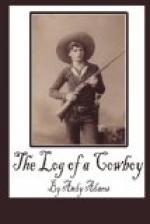I shall never forget the next morning,—August 26, 1882. As we of the third guard were relieved, about two hours before dawn, the wind veered around to the northwest, and a mist which had been falling during the fore part of our watch changed to soft flakes of snow. As soon as we were relieved, we skurried back to our blankets, drew the tarpaulin over our heads, and slept until dawn, when on being awakened by the foreman, we found a wet, slushy snow some two inches in depth on the ground. Several of the boys in the outfit declared it was the first snowfall they had ever seen, and I had but a slight recollection of having witnessed one in early boyhood in our old Georgia home. We gathered around the fire like a lot of frozen children, and our only solace was that our drive was nearing an end. The two placermen paid little heed to the raw morning, and our pilot assured us that this was but the squaw winter which always preceded Indian summer.
We made our customary early start, and while saddling up that morning, Flood and the two placer miners packed the beef on their two pack horses, first cutting off enough to last us several days. The cattle, when we overtook them, presented a sorry spectacle, apparently being as cold as we were, although we had our last stitch of clothing on, including our slickers, belted with a horse hobble. But when Flood and our guide rode past the herd, I noticed our pilot’s coat was not even buttoned, nor was the thin cotton shirt which he wore, but his chest was exposed to that raw morning air which chilled the very marrow in our bones. Our foreman and guide kept in sight in the lead, the herd traveling briskly up the long mountain divide, and about the middle of the forenoon the sun came out warm and the snow began to melt. Within an hour after starting that morning, Quince Forrest, who was riding in front of me in the swing, dismounted, and picking out of the snow a brave little flower which looked something like a pansy, dropped back to me and said, “My weather gauge says it’s eighty-eight degrees below freezo. But I want you to smell this posy, Quirk, and tell me on the dead thieving, do you ever expect to see your sunny southern home again? And did you notice the pock-marked colonel, baring his brisket to the morning breeze?”
Two hours after the sun came out, the snow had disappeared, and the cattle fell to and grazed until long after the noon hour. Our pilot led us up the divide between the Missouri and the headwaters of the Musselshell during the afternoon, weaving in and out around the heads of creeks putting into either river; and towards evening we crossed quite a creek running towards the Missouri, where we secured ample water for the herd. We made a late camp that night, and our guide assured us that another half day’s drive would put us on the Judith River, where we would intercept the Fort Benton road.




